North Estonia
The northern region of Estonia is the most visited region in the country.
Cities, towns and villages
- 🌍 Tallinn – The capital, and financial and cosmopolitan centre of Estonia, with a medieval Old Town. Beautiful and expensive.
- 🌍 Rakvere – Estonia's fifth largest city, east of Tallinn, famous for its Punk and Rock festivals and spirit.
- 🌍 Paldiski – A coastal and formerly closed military town during the Soviet era.
- 🌍 Kunda – A small town with a historic cement plant and port on the shore of the Gulf of Finland.
- 🌍 Tapa – A junction railway station and one of the largest ex-Soviet military towns in Estonia.
- 🌍 Käsmu – A coastal village inside of Lahemaa National Park.
- 🌍 Türi – The spring capital of Estonia with a range of monuments of Estonian functionalism.
- 🌍 Võsu – A small coastal borough inside of Lahemaa National Park.
- 🌍 Aruküla – A small borough
- 🌍 Kaberneeme – A coastal village
- 🌍 Laulasmaa – A coastal village
Other destinations
- 🌍 Lahemaa National Park – On the coast within an hour east (50 km) of Tallinn. Given its size it is the largest park in Estonia and one of Europe's biggest national parks, with 1000 km2 of bogs, trails, coastline, forests, and 4 manors. It allows for convenient up to medium difficulty day trips and hikes from Tallinn.
Understand
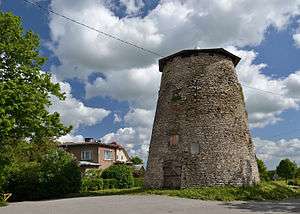
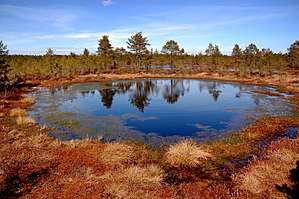
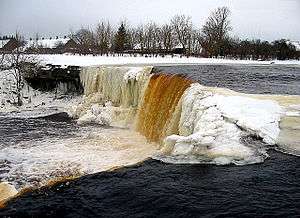
North Estonia contains the capital Tallinn, whose UNESCO-protected medieval Old Town is the country's premier attraction. The region covers four counties: Harjumaa (Rugel), Lääne-Virumaa, Raplamaa and Järvamaa. North Estonia is one of the most developed and industrial regions (together with East Estonia). It has the largest population, continuously growing.
Unlike the crowded Tallinn, the rural part of Northern Estonia enjoys incomparably less popularity. However, there are impressive natural attractions: the bogs and boulders of Lahemaa Park, coastal rocks and major Estonian waterfalls. There is also a share of architectural values in the region – from medieval churches, castles, and manors to the architecture of the 20th century.
This region was dominated by Denmark in the 13th century until the "Revolt of the Night of St. George".
Get in
Tallinn contains Estonia's main port and airport. If arriving from Latvia or Russia overland along major roads the road signs say "Tallinn" all the way from the border. There are also direct trains from Saint Petersburg.
Get around
Most villages, towns and cities are connected by regular bus services. Smaller places are often only served in the morning or noon, and late afternoon (17/18:00). Cities generally have buses up to 21:00. Make sure, you do not miss the last bus.
Bus and train schedules are easily available online – read more under Estonia#Get around.
See
- 🌍 Jägala Falls (Jägala juga) (It is located some 20 km east of Tallinn, 15-30 min car drive.). This is Estonia's largest waterfall. It is better to go early in the morning to catch the soft dawn light or in the evening when the sun shines on the falls. During cold winters, Jägala Falls freezes in a spectacular fashion and is well worth seeing.
- 🌍 Kunda Cement Museum (Kunda Tsemendimuuseum), Kunda, ☎ +372 3222170. Mo-Fr 09–15:00.
.jpg)
- 🌍 Ämari Pilots’ Cemetery (Ämari lennuväe kalmistu), Ämari tee (between Ämari village and the current airforce base). This cemetery is the last resting place of a number of Estonia's fighter pilots who served in the airforce under Soviet rule before 1991. Pilots of which the aircraft were downed and recovered have their graves decorated with the tail fin of their aircraft instead of a generic tomb stone, making the cemetery look like a squadron of jet fighters buried in the forest.
Manors
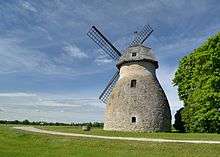
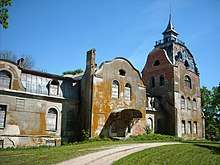
The following are mostly around Rakvere. There are 4 more in Lahemaa National Park.
- 🌍 Aaspere Manor (Aaspere mõis). One of the largest estates in this part of Estonia. In addition to the majestic house in the neoclassicism style, there are numerous official buildings, a huge park and a windmill in the form of a bottle.
- 🌍 Arkna Manor (Arkna mõis). An interesting manor house, built in 1877-79 in the style of eclecticism. The porch, for example, bears a clear shade of neo-Gothic, and the building itself is closer to classicism. Nowadays, the estate is privately owned and essentially abandoned.
- 🌍 Veltsi Manor (Veltsi mõis). A manor house in the style of neoclassicism (end of the 19th century), and a very nice distillery, carelessly built of huge cobblestones. In addition, a small park completes the surroundings.
- 🌍 Inju Manor (Inju mõis). A remarkable manor house in the style of neo-Renaissance, built in 1894.
- 🌍 Mõdriku Manor (Mõdriku mõis). A large manor house with a central building in the spirit of classicism. In addition, there is a landscape park with ponds and a war memorial of 1812.
- 🌍 Mädapea Manor (Mädapea mõis). A brick building in the style of neoclassicism, built in 1850. Inside a collection of paintings and objects of everyday life can be found. When agreed with the owner, a look inside is possible.
- 🌍 Neeruti Manor (Neeruti mõis). A monument of a bizarre composition of architectural styles and the recklessness of the architect. Likely from the 19th century, when it was more or less a typical building in the spirit of classicism. In the early 20th century it was remade for modernisation purposes. Consequently, it turned into a strange form with elements of modernity and eclecticism. According to reports, Karl Schmidt, the author of many modern buildings in Saint Petersburg and Pavlovsk, immortalized himself here.
- 🌍 Ulvi Manor (Ulvi Mõis). A nice manor house in the style of eclecticism, built between 1881-82.
- 🌍 Uhtna Manor (Uhtna mõis). This manor consists of a one-storey building, decorated with a luxurious portico in the style of classicism from 1820, including technical buildings of the same period; the barn and the stable have been preserved.
- 🌍 Voore Manor (Voore mõis). The manor house slowly wilts. The interest part is a stone barn of the 18th century with five semicircular arches. The building is unexpectedly large and carefully designed from an architectural point of view.
Do
- Hiking in Lahemaa National Park
- Enjoying the beaches of the northern Estonian coast
- 🌍 Fishing (Haljala Forell), ☎ +372 57493178. Trout farming in the northern outskirts of Halyal (10 km from Rakvere to the north). Fishing in the pond (hire fishing rods and selling food, as well as a free opportunity to dig worms for fishing). There, for a fee, the catch is smoked. Including restaurant and playground.
- 🌍 Viikingite küla (Viking village), Saula küla, Harjumaa (29 km from Tallinn, next Pirita river and Tallinn-Tartu highway). The "Vikings' Village" is a theme park. In a deep forest, a scenic place with a tavern, accommodation and its own small lake, from where everyone can catch their own fish and get it cooked. It is suitable for a day out with kids but too tacky for adults. Prices are very reasonable.
Eat
Drink
Sleep
In the following a list of various accommodation options in the region worth mentioning and outside of the above covered cities, towns, and parks:
- 🌍 Vinni Hostel, Sõpruse 2, Vinni (10 km from Rakvere), ☎ +372 5227710, e-mail: info@vinnihostel.ee. Cheap accommodation in the vicinity of the Vinni sports complex. €10 pP.
- 🌍 Vinni Spordikompleks Hotel, Sõpruse 16, Vinni (10 km from Rakvere), ☎ +372 3257164. Slightly more expensive and convenient accommodation than the nearby hostel, inside the sports complex. The room rate includes unlimited access to the swimming pool and gym. €16 pP, €49 double (2013).
- 🌍 Kadrina Spordikeskuse Hostel, Rakvere tee 14, Kadrina, ☎ +372 58717665, +372 5176237, e-mail: hostel@kadrina.ee. Dorm from €10.
- 🌍 Sireli Homestay, Mäo. Lovely garden and cosy wood stove – like staying in your own home. The owners are very hospitable. Apartment from €17.
- 🌍 Valtu Spordimaja Hostel, Saare 11, Kehtna, ☎ +372 4892490, +372 4894160, e-mail: info@valtuspordimaja.ee. Family friendly, meals on request, sauna, café – what do you need more? Dorm from €12.
Go next
- West Estonia and Islands – Islands, Baltic Sea, spas, beaches, and wild life habitat for birds moving towards the south in fall.
- East Estonia – Beautiful north coast of Lake Peipsi, and gateway to Russia through the border city Narva. More people speak Russian than Eesti here.
- South Estonia – Famous for the intellectual hub, ancient city and university town Tartu, and many picturesque town like Viljandi.